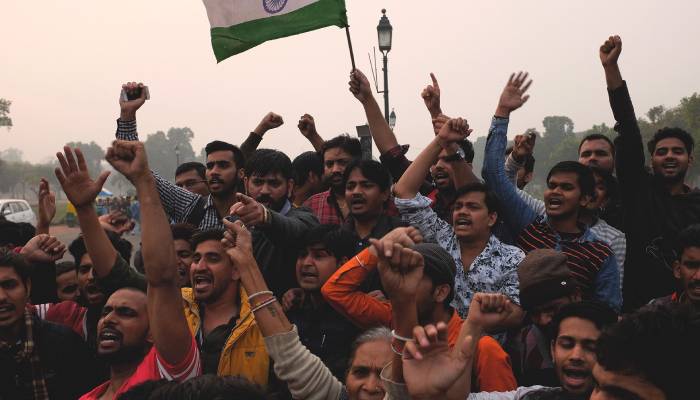
or

As a concerned citizen of India, I feel bad when in a democracy, people are lathi charged and tear gas is used against them while protesting peacefully without arms. Everyone under the Indian constitution has a right to assemble peacefully without arms.
The people, who had been protesting at the India Gate or for that matter anywhere else, were not hooligans or goondas who should be lathi charged. They were protestors who were seeking justice by securing a change in policy. Our government has to understand that in a democracy people’s voice is supreme and even the Preamble to Constitution starts with: “We the people of India”, which implies that the ultimate source of power is with the ‘people’ and their will is supreme. The use of tear gas by Delhi police is really unfortunate. Order 152 of Police rules provides that “A regular warning by the officer should be issued while firing the tear smoke shells” but it is seldom followed.
Innocent people got injured during the India Gate protest. They were not demanding something except peace in the society. Also, the application of Section 144 Cr.PC sometimes creates a lot of questions regarding police functioning in India.
On the bare reading of the language of Section 144 Code of Criminal Procedure, it is clear that the entire basis of an action under this section is the ‘urgency of the situation’ and the power conferred therein for preventing ‘disorder, obstruction and annoyance’, with a view to secure the public weal by maintaining public peace and tranquility.
In the case of Gulam Abbas & Ors vs State Of U.P. & Ors, AIR 1981 SC 2198, the court clearly stated that preservation of public peace and tranquility is the primary function of the government and the aforesaid power is conferred on the executive. In a given situation, a private right must give in to public interest.
Article 355 of the constitution provides that the government of every state would act in accordance with the provisions of the constitution. The primary task of the state is to provide security to all citizens without violating human dignity. Powers conferred upon the statutory authorities have to be, perforce, admitted. In H. H. Maharaja dhiraja Madhav Rao Jivaji Rao Scindia Bahadur and Ors. v. Union of India, AIR 1971 SC 530, the court held that even in civil commotion or even in war or peace, the state cannot act catastrophically outside the ordinary law and there is legal remedy for its wrongful acts against its own subjects or even a friendly alien within the state.
The citizens/persons have a right to leisure; to sleep; not to hear and to remain silent. The knock at the door, whether by day or by night, as a prelude to a search without authority of law amounts to be police incursion into privacy and violation of fundamental right of a citizen(See: Wolf v. Colorado (1948) 338 US 25). The incidence of lathi charge and use of tear gas is not a present one.
In Re- Ramlila Maidan vs. Home Secretary, 2012(1)Crimes241(SC), the court directed the state government and the commissioner of police to register and investigate cases of criminal acts and offences, destruction of private and public property against the police officers/personnel along with those members of the assembly, who threw bricks at the police force causing injuries to the members of the force as well as damage to the property, issued the following directions:
The author is law graduate

Lex Witness Bureau

Lex Witness Bureau

For over 10 years, since its inception in 2009 as a monthly, Lex Witness has become India’s most credible platform for the legal luminaries to opine, comment and share their views. more...
Connect Us:


The Grand Masters - A Corporate Counsel Legal Best Practices Summit Series
www.grandmasters.in | 8 Years & Counting
The Real Estate & Construction Legal Summit
www.rcls.in | 8 Years & Counting
The Information Technology Legal Summit
www.itlegalsummit.com | 8 Years & Counting
The Banking & Finance Legal Summit
www.bfls.in | 8 Years & Counting
The Media, Advertising and Entertainment Legal Summit
www.maels.in | 8 Years & Counting
The Pharma Legal & Compliance Summit
www.plcs.co.in | 8 Years & Counting
We at Lex Witness strategically assist firms in reaching out to the relevant audience sets through various knowledge sharing initiatives. Here are some more info decks for you to know us better.
Copyright © 2020 Lex Witness - India's 1st Magazine on Legal & Corporate Affairs Rights of Admission Reserved